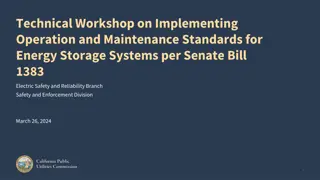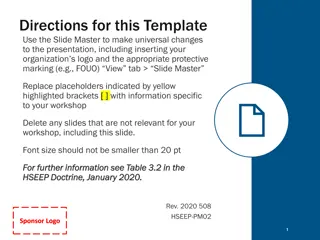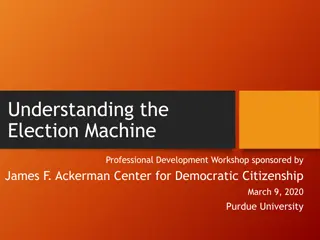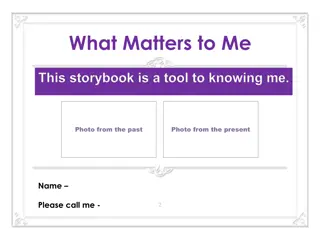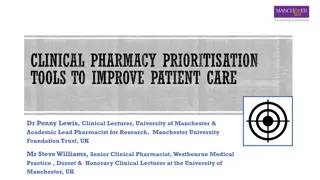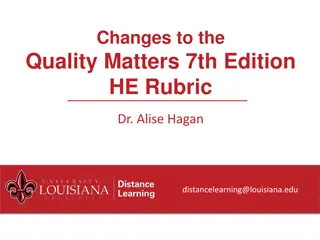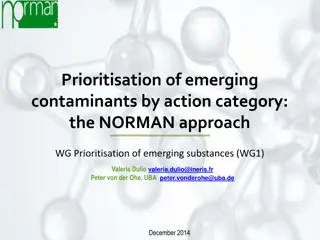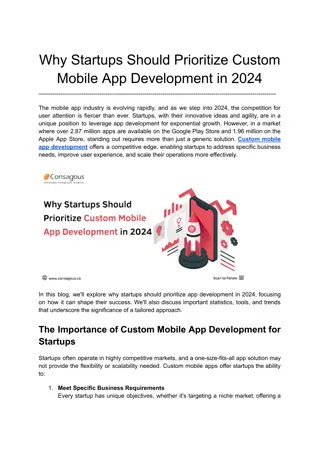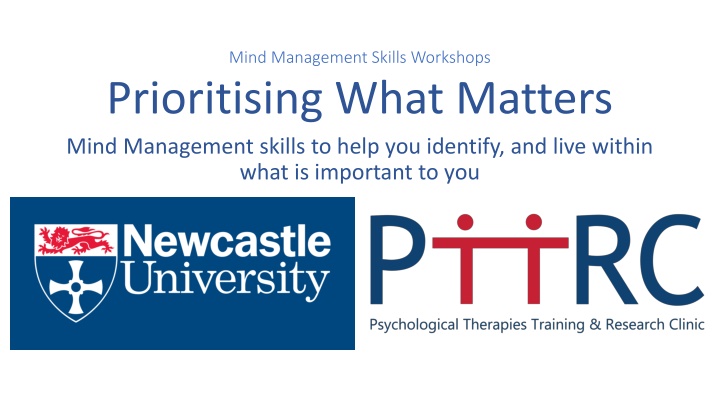
Prioritising What Matters: Mind Management Skills Workshops
Explore mind management skills workshops aimed at helping you identify and live within what is important to you. Join us to gain insights into prioritising what matters most in your life through Cognitive Behavioral Therapy (CBT) principles and values-based living.
Download Presentation

Please find below an Image/Link to download the presentation.
The content on the website is provided AS IS for your information and personal use only. It may not be sold, licensed, or shared on other websites without obtaining consent from the author. If you encounter any issues during the download, it is possible that the publisher has removed the file from their server.
You are allowed to download the files provided on this website for personal or commercial use, subject to the condition that they are used lawfully. All files are the property of their respective owners.
The content on the website is provided AS IS for your information and personal use only. It may not be sold, licensed, or shared on other websites without obtaining consent from the author.
E N D
Presentation Transcript
Mind Management Skills Workshops Prioritising What Matters Mind Management skills to help you identify, and live within what is important to you
PTTRC Mind Management Workshops Our clinic Psychological Therapies Training and Research Clinic data is required to help us develop these groups and understand what works Our roles: Cognitive Behavioural Therapists and Clinical Psychologists (and trainee clinicians) The purpose of these workshops to reach a greater number of students experiencing common emotional problems and stressors Based fully on the student voices and reports of what issues cause you distress Based on CBT Invitation to learn new skills and meet new people
Housekeeping Today s workshop will run for 90 minutes and is designed to be interactive we encourage participation Confidentiality you are not expected to share anything that you do not want to, however we do request that anything that is shared remains confidential and is not shared with any one else outside of the group Please be respectful of other group members who may choose to share their experiences maintain the confidentiality of the group
Further Support The workshops are designed to be skills-focussed, rather than problem-centred. However, if any of today s discussion or exercises cause you to experience distress, or you feel you need further support, you may wish to pursue further help Services: Accessing the Student Health and Wellbeing Service Listening services such as the Nightline and the Samaritans Evidence based therapy through NHS IAPT services (GP referral or self referral)
Why this workshop for undergraduate students? In our focus groups, undergraduate students reported to us they struggled to find a varied level of activity, particularly doing things that is important to them student culture Stress of keeping on top of work, social life lack of meaning
Goals for today Understand how we get caught in vicious cycles based on CBT principles Understand what values based living is and why it is important to our wellbeing Identify values and consider how you can live within your values
What is CBT Cognitive: refers to the thoughts you have about yourself, other people and the situations/events that take place around you. Behavioural refers to what you do or don t do because of how you are thinking or feeling We will explore now how your thoughts, emotions and behaviours are interconnected and relate to situations/events you find yourself in. We call this the vicious cycle .
Vicious Cycle Trigger Thoughts Behaviour Emotions Psychological Therapies Training and Research Clinic; School of Psychology
Vicious Cycle Evening time, sick of studying, unsure what to do there is no point in anything, I am bored, there is nothing to do, I don t fit in Go on phone, social media to pass time Low, restless Psychological Therapies Training and Research Clinic; School of Psychology
Vicious Cycle Finished a deadline, unsure what to occupy time with now There is no meaning in anything, others seem to have their thing , I don t know what to do with myself Ruminate on what others are doing, think endlessly of things I can do but don t do them Low, sad, lonely Psychological Therapies Training and Research Clinic; School of Psychology
Over to you In small groups of 2 or 3, consider an example of a time that you felt low, sad or that you weren t doing anything that mattered, and this made you feel bad. Consider: - What situation, event or trigger was happening at the time? (what was happening that meant I was too busy, overwhelmed etc) - What thoughts were going through your mind then, about the events? - How did those thoughts make you feel? (emotionally and/or physically) - How did the way you were feeling make you behave? What did you do at the time? - Were you in a vicious cycle?
The importance of our behaviours We all get stuck in vicious cycles What we do [behaviours] affects how we feel, and in turn how we think The important thing is to notice when we are stuck and pay attention to our mood states what are they telling us? We do have the power to influence our response to things, and choose to do what's important to us This takes discipline, but it is ok for the makeup of our behaviours to fluctuate We know that positive affect (how we feel) is linked to valued and meaningful activity
What do we mean by values? Our values are an internal compass which guide us through life Values are often different goals they may have an end-point (they change!) Values can be life long Values give life meaning and purpose No meaning could equal life dissatisfaction
What do we mean by values? Values | Get.gg - Getselfhelp.co.uk
Exercise What is important to you? What do you enjoy? What are you doing when you are at your happiest? What makes you feel accomplished? What makes you feel like you achieved something? When do you feel the most safe? What are you doing? When do you feel your calmest? What are you doing? When are you most content? What are you doing when you are most content And anything else you think is relevant!
Exercise What is important to you? Look back at your vicious cycle Were your behaviours in line with what you just identified was important to you?
Behaviour Reinforcement The Trap in the Vicious Cycle Something rewarding, pleasant, or gratifying follows a behaviour (doing something to feel good or achieved) This increases the likelihood of the behaviour occurring again Positive Reinforcement Something unwanted or unpleasant reducing (a distressing feeling) goes away as a result of a behaviour (e.g. avoidance) Nothing bad happens imminently so this increases the likelihood of the behaviour occurring again Negative Reinforcement
Behaviour Reinforcement The Trap in the Vicious Cycle 1.-Introduction-to-BA-for-depression-revised-2021.pdf - sourced from: (slam- iapt.nhs.uk)
The Values Wheel Health Leisure Relationships Work
The Values Wheel Health Leisure Relationships Work
A more detailed look 1.-Introduction-to-BA-for-depression-revised-2021.pdf - sourced from: (slam- iapt.nhs.uk)
Exercise A values assessment On our handouts, you have a range of different values Each value has a price You have 100 to spend Choose which values you would buy to help us establish what is important to you Exercised adapted from: anxietyhappens.com
Exercise A values assessment Feedback Any more values come to mind?
3 pillars to consider Importance Enjoyment Achievement
Values Behaviour In order to live within our values, we need to operationalise them into behaviour i.e. something we can do There may be values based activity that we can do every day Some values may be much more spaced out than that, and that s ok Values aren t simply things we enjoy , they are things that are important, and/or necessary to reach to our goals if they make us feel accomplished or achieved they are valued and have meaning There is also value and meaning in feeling safe and content they may be activities that do not specifically bring on joy, but which you feel relaxed and not wanting/pursuing more. The ability to be
Values Behaviour Exercise Behaviour Value Pillar How often Health being physically fit Running with music on or podcast Important Enjoyment 1-2 times per week Connected to loved ones Phone loved one (grandparent, parent) Go out for a family meal Important 2 times per week 1nce every quarter Religion/faith Prey Attend religious ceremony Important Enjoyment 1nce per day 1nce per week Career Attend lectures Do research for my project (end goal: degree) Important Achievement When scheduled 2 x per week for 4 hours Being a good friend Bring up in conversation how my friend is doing Achievement Every 2 weeks
Values Behaviour Exercise Behaviour Value Pillar How often
Values Behaviour Exercise Feedback Any struggles operationalising values? Is a value identified new and/or appealing and your not sure what behaviour would align with it?
The Values Wheel Health Leisure Relationships Work
Make Time We know that sometimes values based living falls out of sync.. Life can run away with us Lets notice when we are stuck, and consider what value can be incorporated into your life at that time to promote positive affect and break the vicious cycle It takes discipline we often say I haven t got any time to go for my run, I have to much to do! this is the time your valued behaviours are more important than ever You can amend how long you may do a value based behaviour for and how often Health Leisure Relationships Work
Health Summary Leisure Relationships Work


